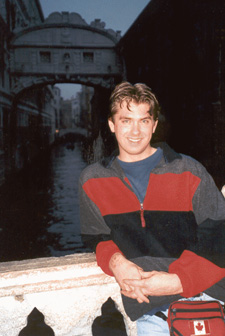Queering Luther
 Note: The son of two Lutheran pastors, Vaughn Roste is a Canadian who has worshipped and worked in Episcopalian, Presbyterian, United and Christian Reformed Churches, but his current employment is teaching at a United Methodist College. He has visited five continents and lived on four of them, holds three degrees in two different areas (theology and music), and has written one book: “The Xenophobe’s Guide to the Canadians,” available at Amazon.com.
Note: The son of two Lutheran pastors, Vaughn Roste is a Canadian who has worshipped and worked in Episcopalian, Presbyterian, United and Christian Reformed Churches, but his current employment is teaching at a United Methodist College. He has visited five continents and lived on four of them, holds three degrees in two different areas (theology and music), and has written one book: “The Xenophobe’s Guide to the Canadians,” available at Amazon.com.
The title of this article is surprising, perhaps even offensive to some people. It combines two powerful words in a way that might seem strange to most. What could queer – a word connected with homosexuality – and Luther possibly have in common?
My purpose here is not to offend, or even surprise, but to identify some points of common ground. All I ask is that you hear me out. I believe that we all must try to be open to seeing issues, including but not only homosexuality, from every side, especially the side with which we don’t agree. Failing this, communication is impossible.
I had an interesting conversation in Amsterdam about the Lutheran Church with a person named Raim. Raim had a “stereotypically” effeminate nature, and in the course of sharing our stories, it turned out that he was, in fact, gay.
What he hated was how people assumed this about him before they ever knew it to be true. While growing up in Indonesia, he was called “faggot” by his peers, friends and even his family. It became a second name to him, to the elimination of his first. Long before he knew what the word even meant, he was forced to take it on as an identity.
Raim was unfamiliar with Lutheran history, so I was doing my best to explain the situation in the 1520s. Raim had, however, heard of the Reformation and seemed surprised to learn that we Lutherans (as we would only later be called) started it. Well, more or less.
I was explaining what I could remember about the basics: 95 theses, indulgences, the Diet of Worms. Then I came to my favourite part, “Here I stand. I can do no other.” Raim said something that took me aback, made me think, surprised me. He said, “That was kind of like Luther’s coming out, wasn’t it?”
Well, yeah, Raim, I’ve never really thought about it that way before, but come to think of it, it is kind of like that.
For gay people, coming out is the moment when they first reveal their sexual orientation to someone else. Often it is to close friends or to other gay people before their own parents know, let alone their pastor. Prior to this moment, gays and lesbians are said to be “in the closet” about their orientation.
Luther said, “Here I stand” and came out. There are no revisionist historians claiming that Luther was really homosexual; no, Luther’s heterosexuality is beyond question. However, in Raim’s modern terminology, Luther came out as a closet Protestant, long before the term was coined. (Just as people were homosexual long before that term was coined as well).
When a lesbian or gay person comes out of the closet, they are in effect saying, “Here I stand. I can do no other.” This is especially true for those gays or lesbians who try to stay in the church – a task some on both sides of the issue see as impossible, even if they would like to have it be otherwise.
We have to put the Gospel into the terms of those we evangelize, do we not? When missionaries are sent out, it is their job to learn the indigenous language, not to teach the people there to speak the missionaries’ language. Why is it that we often do a particularly poor job of evangelism when those to whom we are sent speak the same language as we do? If we are really serious about welcoming all into God’s grace, we need to invite our neighbours who are gay to come with us to church: we need to learn their language.
Lutherans share this meeting point with gay and lesbian people. We all understand what it means to come out. We both know what it means to say, “Here I stand, I can do no other.” Together, we have at least that point on which we can come out and stand in solidarity.
In my conversation with Raim that day, he was not the only person who did the learning. I’m very glad for that. Would that more learning happens today in this church. Here I stand: we can do no other.
Vaughn Roste lives in Edmonton where he is studying at the University of Alberta and is involved with the Lutheran Student Movement on campus.